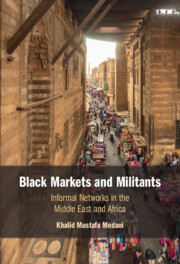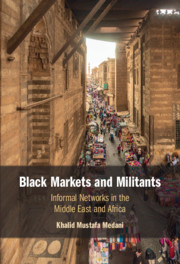Refine search
Actions for selected content:
8 results
5 - From Remittance Economy to Rentier State: The Rise and Fall of an Islamist Authoritarian Regime in Sudan
- from III - Globalization and Institutional Change in an Era of Scarcity
-
- Book:
- Black Markets and Militants
- Published online:
- 20 August 2022
- Print publication:
- 08 September 2022, pp 178-218
-
- Chapter
-
- You have access
- Open access
- HTML
- Export citation
2 - Investing in Islamism: Labor Remittances, Islamic Banking, and the Rise of Political Islam in Sudan
- from II - The Institutional Context in an Era of Abundance
-
- Book:
- Black Markets and Militants
- Published online:
- 20 August 2022
- Print publication:
- 08 September 2022, pp 92-127
-
- Chapter
-
- You have access
- Open access
- HTML
- Export citation
1 - “The House the Boom Built”: The Informal Economy and Islamist Politics in Egypt
- from II - The Institutional Context in an Era of Abundance
-
- Book:
- Black Markets and Militants
- Published online:
- 20 August 2022
- Print publication:
- 08 September 2022, pp 23-91
-
- Chapter
-
- You have access
- Open access
- HTML
- Export citation

Black Markets and Militants
- Informal Networks in the Middle East and Africa
-
- Published online:
- 20 August 2022
- Print publication:
- 08 September 2022
-
- Book
-
- You have access
- Open access
- Export citation
2 - Investing in Islamism: Labor Remittances, Islamic Banking, and the Rise of Political Islam in Sudan
- from II - The Institutional Context in an Era of Abundance
-
- Book:
- Black Markets and Militants
- Published online:
- 01 October 2021
- Print publication:
- 14 October 2021, pp 92-127
-
- Chapter
- Export citation
5 - From Remittance Economy to Rentier State: The Rise and Fall of an Islamist Authoritarian Regime in Sudan
- from III - Globalization and Institutional Change in an Era of Scarcity
-
- Book:
- Black Markets and Militants
- Published online:
- 01 October 2021
- Print publication:
- 14 October 2021, pp 178-218
-
- Chapter
- Export citation
1 - “The House the Boom Built”: The Informal Economy and Islamist Politics in Egypt
- from II - The Institutional Context in an Era of Abundance
-
- Book:
- Black Markets and Militants
- Published online:
- 01 October 2021
- Print publication:
- 14 October 2021, pp 23-91
-
- Chapter
- Export citation

Black Markets and Militants
- Informal Networks in the Middle East and Africa
-
- Published online:
- 01 October 2021
- Print publication:
- 14 October 2021
-
- Book
- Export citation
